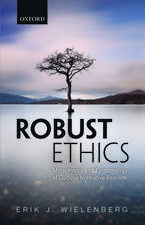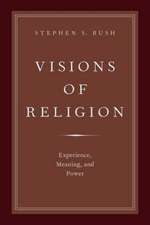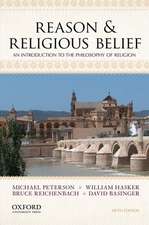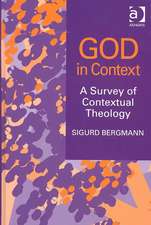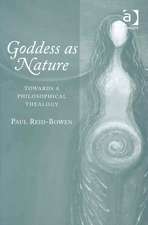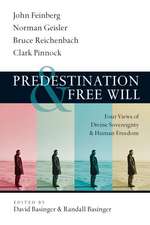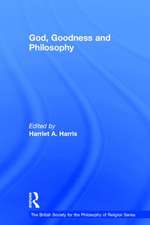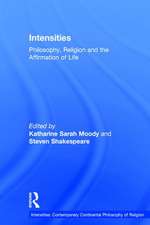Religious Diversity: A Philosophical Assessment: Routledge Philosophy of Religion Series
Autor David Basingeren Limba Engleză Paperback – 22 feb 2002
Din seria Routledge Philosophy of Religion Series
-
 Preț: 311.06 lei
Preț: 311.06 lei - 26%
 Preț: 765.45 lei
Preț: 765.45 lei -
 Preț: 479.42 lei
Preț: 479.42 lei -
 Preț: 373.56 lei
Preț: 373.56 lei -
 Preț: 374.47 lei
Preț: 374.47 lei -
 Preț: 381.57 lei
Preț: 381.57 lei
Preț: 254.13 lei
Preț vechi: 308.78 lei
-18% Nou
Puncte Express: 381
Preț estimativ în valută:
48.64€ • 51.06$ • 40.18£
48.64€ • 51.06$ • 40.18£
Carte tipărită la comandă
Livrare economică 30 ianuarie-13 februarie 25
Preluare comenzi: 021 569.72.76
Specificații
ISBN-13: 9780754615217
ISBN-10: 0754615219
Pagini: 132
Dimensiuni: 156 x 234 x 20 mm
Greutate: 0.2 kg
Ediția:1
Editura: Taylor & Francis
Colecția Routledge
Seria Routledge Philosophy of Religion Series
Locul publicării:Oxford, United Kingdom
ISBN-10: 0754615219
Pagini: 132
Dimensiuni: 156 x 234 x 20 mm
Greutate: 0.2 kg
Ediția:1
Editura: Taylor & Francis
Colecția Routledge
Seria Routledge Philosophy of Religion Series
Locul publicării:Oxford, United Kingdom
Cuprins
Contents: Preface; Introduction; Diversity and epistemic obligation; Diversity and justified belief; Diversity and pluralism; Diversity and eternal destiny of humankind; Diversity and positive apologetics; Diversity and teaching; Selected readings; Index.
Notă biografică
David Basinger, Roberts Wesleyan College, New York, USA
Recenzii
’In this clear and accessible study of the major epistemic questions concerning religious diversity, Professor Basinger deals the final blow to the fashionable position that exclusivism is no longer intellectually credible’. Marcel Sarot, University of Utrecht, Netherlands ’Basinger's book provides a cutting edge perspective on religious diversity. These arguments on issues ranging from the afterlife to philosophical pedagogy will provoke lively and illuminating debates’. Kevin Meeker, University of South Alabama, USA 'Because Basinger faces squarely several important problems, his arguments are worth close attention...' Choice 'The issues he addresses and his treatment of them have important implications for Christian thinkers in other domains such as theology, apologetics, and public policy... In this helpful new work, David Basinger,..., provides a concise introduction to some of the philosophical issues and positions in current discussions over religious diversity... Basinger has written a helpful and accessible book which reflects not only his admirable mastery of the literature but also the wisdom that comes from years of experience in working through these issues in the classroom.' Trinity Journal 'The author, an American philosopher of religion, tells us that he has taught at least eight thousand students over twenty-seven years... Basinger's account ranges over a number of situations of diversity/conflict... He is courteous and fair to opponents, clear in exposition, and provides useful summaries at the end of each chapter for easy reference.' Theology 'This book provides a well-constructed defence for the exclusivist position and will be suitable for upper-level undergraduate courses in both philosophy and theology. Since the chapters do not follow a strict argument, they may also be read selectively. It provides a clear and concise overview of proponents and opponents of exclusivism and is therefore also very valuable for any graduate or fur
Descriere
Religious diversity exists whenever seemingly sincere, knowledgeable individuals hold incompatible beliefs on the same religious issue. Diversity of this sort is pervasive, existing not only across basic theistic systems but also within these theistic systems themselves. Religious Diversity explores the breadth and significance of such conflict. Examining the beliefs of various theistic systems, particularly within Christianity, Judaism, Hinduism and Buddhism, Basinger discusses seemingly incompatible claims about many religious issues, including the nature of God and the salvation of humankind. He considers particularly the work of Hick, Gellman, Plantinga, Schellenberg, Alston, Wainwright, and Quinn, applying their perspectives on 'exclusivism' and 'pluralism' as they become relevant to the issues in question. Basinger's survey of the relevant literature, proposed solutions, and fresh insights offer an invaluable contribution not only for philosophers of religion and philosophical theologians but for anyone interested in the increasingly significant question of what a religious believer can or cannot justifiably say about their religious perspective.


